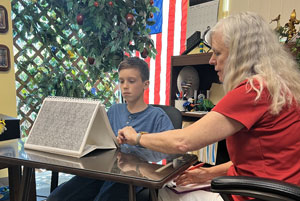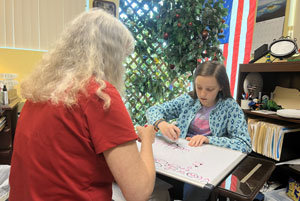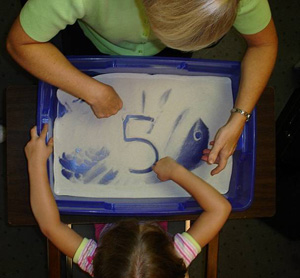Visual Processing Therapy
“Unless Your Eye Be Single…”
The Bible verse “Unless your eye be single your body will be full of darkness,” (Matthew 6:23) has a depth of meaning that I missed for years and years. I now understand that Bible verse as a confirmation that a person’s visual skills must be strong enough to enable that person to see and understand knowledge. Each eye works separately, but for efficient learning, both eyes must work together, quickly, comfortably, and for sustained periods of time. The prevalence of visual processing problems, as measured in a study, found that 96% of those children with learning disabilities between the ages of 6 and 13 years, had problems with smooth efficient eye movements.

The question must be answered why did the child fail?
There are three components of Visual Processing:
1. Visual Gathering and Visual Efficiency affect a person’s
2. Visual Motor Integration Skills which in turn affects the person’s
3. Visual Perception.
1. Visual Gathering & Efficiency
Eye Teaming and Facility
Eye Focusing and Facility
Eye Tracking (Pursuits and Saccades)
2. Visual-Motor Integration
Establish hand dominance
Letter & Number Recognition
Proper Letter & Number Formation
Establish a foundation for Phonics
Establish a foundation for Math
3. Visual Perceptual Skills
Visual Discrimination
Visual Memory
Visual Spatial Relationships
Visual Form Constancy
Visual Sequential Memory
Visual Figure Ground
Visual Closure

A Visual Processing Screening will need to be administered to determine the actual weaknesses. A vital element of the screening is an analysis of the child’s symptoms.

- covers or closes one eye when reading
- rubs eyes
- complains of headaches
- complains of words moving on the page
- inattentive
- trouble looking from board to desk
- is exhausted at the end of the day
- trouble learning left from right
- reverses letters and numbers
- can respond orally but not in writing
- mistakes words with similar beginnings
- can’t recognize the same word repeated
- excessive head movement when reading
- forgets how to formulate letters
- loses place often when reading
- must use finger to keep place
- skips lines and words
- poor reading comprehension
- short attention span
- transposes letters and numbers
- poor recall of visual material
- trouble with spelling sloppy writing skills
- erases excessively
- trouble copying from board
- trouble copying from a book
- trouble learning math facts
- tilts the head when reading
- eyes burn or tear up

